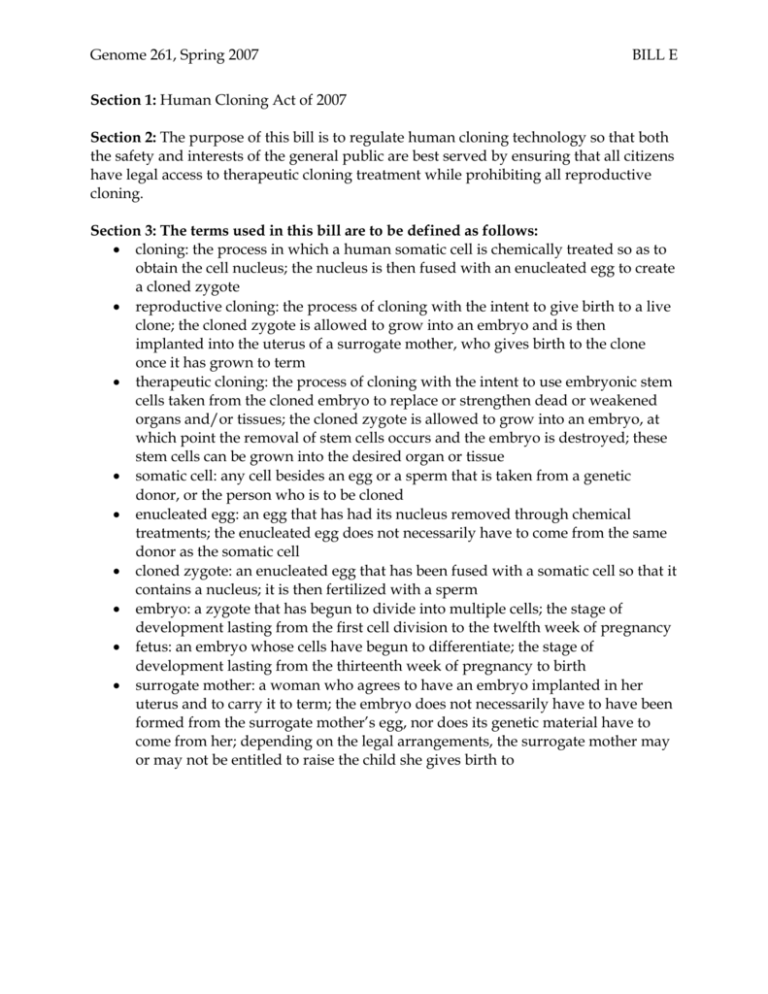BillE
advertisement

Genome 261, Spring 2007 BILL E Section 1: Human Cloning Act of 2007 Section 2: The purpose of this bill is to regulate human cloning technology so that both the safety and interests of the general public are best served by ensuring that all citizens have legal access to therapeutic cloning treatment while prohibiting all reproductive cloning. Section 3: The terms used in this bill are to be defined as follows: cloning: the process in which a human somatic cell is chemically treated so as to obtain the cell nucleus; the nucleus is then fused with an enucleated egg to create a cloned zygote reproductive cloning: the process of cloning with the intent to give birth to a live clone; the cloned zygote is allowed to grow into an embryo and is then implanted into the uterus of a surrogate mother, who gives birth to the clone once it has grown to term therapeutic cloning: the process of cloning with the intent to use embryonic stem cells taken from the cloned embryo to replace or strengthen dead or weakened organs and/or tissues; the cloned zygote is allowed to grow into an embryo, at which point the removal of stem cells occurs and the embryo is destroyed; these stem cells can be grown into the desired organ or tissue somatic cell: any cell besides an egg or a sperm that is taken from a genetic donor, or the person who is to be cloned enucleated egg: an egg that has had its nucleus removed through chemical treatments; the enucleated egg does not necessarily have to come from the same donor as the somatic cell cloned zygote: an enucleated egg that has been fused with a somatic cell so that it contains a nucleus; it is then fertilized with a sperm embryo: a zygote that has begun to divide into multiple cells; the stage of development lasting from the first cell division to the twelfth week of pregnancy fetus: an embryo whose cells have begun to differentiate; the stage of development lasting from the thirteenth week of pregnancy to birth surrogate mother: a woman who agrees to have an embryo implanted in her uterus and to carry it to term; the embryo does not necessarily have to have been formed from the surrogate mother’s egg, nor does its genetic material have to come from her; depending on the legal arrangements, the surrogate mother may or may not be entitled to raise the child she gives birth to Genome 261, Spring 2007 BILL E Section 4: Human Reproductive Cloning a. Legal Regulations 1. The process of human reproductive cloning shall be prohibited under all circumstances. 2. Any person who has knowledge of reproductive cloning being performed is obligated to report it to the police. 3. It is unlawful for any person or organization, public or private, to fund reproductive cloning research or procedures. 4. It is unlawful for a clone created in a foreign country to travel or live within United States borders. 5. In the instance that the surrogate mother is unaware she was implanted with a cloned embryo and is still pregnant with the fetus when she is informed that it is a clone, she has the right to decide whether to terminate the pregnancy or continue on with it. 6. In the instance that a cloned embryo is created without the somatic cell donor’s knowledge and is implanted into a surrogate mother’s uterus without her knowledge of the embryo being a clone, the surrogate mother shall assume legal guardianship of the clone upon birth. Visitation rights by the somatic cell donor, if desired, shall be determined by the courts. 7. In the instance that a cloned embryo is created without the somatic cell donor’s knowledge and is implanted into a surrogate mother’s uterus without her knowledge of the embryo being a clone, should the surrogate mother choose to carry the fetus to term but decline the assumption of legal guardianship of the clone upon birth, the somatic cell donor shall assume legal guardianship. 8. In the instance that a cloned embryo is created without the somatic cell donor’s knowledge and is implanted into a surrogate mother’s uterus without her knowledge of the embryo being a clone, should the surrogate mother choose to carry the fetus to term but decline the assumption of legal guardianship of the clone upon birth along with the somatic cell donor, the government shall assume responsibility for the clone. 9. Any clones under legal guardianship of the government shall receive the same care and be entitled to the same opportunities as any non-cloned foster child. b. Enforcement 1. A physician found guilty of knowingly cloning a somatic cell with the intent of implanting it into a woman’s uterus, or of performing the implantation of a known cloned embryo, shall be sentenced to serve 5 to 10 years in prison, pay a fine of $100,000 per cloned embryo implanted, lifetime monitoring by a probation officer, and permanent revocation of their medical license. 2. A person found guilty of knowingly donating a somatic cell or an egg for the purpose of reproductive cloning, or of agreeing to act as a surrogate mother for a knowingly cloned embryo, shall be sentenced to serve 5 to 10 years in prison. Genome 261, Spring 2007 BILL E 3. Any person who unknowingly participates in reproductive cloning shall not be subject to any legal punishment. 4. Any person who has knowledge of reproductive cloning being performed and fails to report it to the police shall be fined $200. 5. Any person or organization, public or private, that funds reproductive cloning shall be subject to a $500,000 fine. 6. Any person who brings or assists a clone created in a foreign country across United States borders shall be sentenced to serve 6 to 12 months in prison and pay a $10,000 fine per smuggled or assisted clone. 7. Any citizen who is found to have been cloned in a foreign country, whether knowingly or unknowingly, shall be permitted to return to the United States and retain their residency status, however they shall be subject to legal punishment should they attempt to bring this clone within United States borders. 8. Any clone created in a foreign country who enters United States territory shall be subject to immediate deportation to their country of origin. 9. Any person who is knowingly cloned in the United States shall be subject to pay $500 per month to the government in child support of that clone. 10. Any person who is unknowingly cloned shall not be subject to pay child support should they decline legal guardianship of that clone. 11. These legal regulations shall be put into affect for a period of 10 years. After 10 years, they will expire and a new vote shall be taken on them. Section 5: Human Therapeutic Cloning a. Legal Regulations 1. The process of human therapeutic cloning shall be permitted under all circumstances as long as a verifiable medical ailment or condition exists that has the potential to be alleviated by therapeutic cloning treatment. 2. A person must be 18 years of age to consent to being cloned, or they must have parental or guardian consent if underage. 3. Therapeutic cloning shall not be performed except for the benefit of the somatic cell donor. People may donate somatic cells, eggs, and/or any unused tissues and organs, but it shall be unlawful for a person to sell any of these materials for personal profit. 4. The federal government shall allocate a minimum of $500,000 annually for therapeutic cloning research. State funding shall be provided at each state’s discretion. b. Enforcement 1. Any person seeking therapeutic cloning treatment must provide verifiable evidence of an existing medical ailment or condition. This ailment or condition shall first be verified and then deemed either treatable or untreatable by therapeutic cloning. Genome 261, Spring 2007 BILL E 2. The Department of Health and Human Services shall compile a list of all known medical ailments and conditions that have the potential to be alleviated or cured by therapeutic cloning treatment. These conditions do not necessarily have to pose a health risk to the people who have them. They may be cosmetic; they simply must be treatable by therapeutic cloning. This list is to be used by therapeutic cloning physicians to determine whether a person seeking therapeutic cloning treatment can do so or not so that money and resources are not wasted on untreatable ailments and conditions. 3. In the instance that a person seeking therapeutic cloning treatment does not possess an ailment or condition listed on the Department of Health and Human Services list of treatable ailments and conditions, they may petition two cloning physicians to review their case on an individual basis. Both physicians must be in consensus that the ailment or condition is treatable by therapeutic cloning in order for the patient to receive therapeutic treatment. 4. Any therapeutic cloning physician found to have treated a person who cannot provide verifiable evidence of the treated medical ailment or condition, or whose ailment or condition was deemed untreatable by therapeutic cloning, shall be fined $100,000 per illegally treated patient. 5. Any person found to have knowingly received treatment for a medical ailment or condition they either cannot provide verifiable evidence of or which was deemed untreatable by therapeutic cloning shall be fined $20,000. 6. Any physician found guilty of knowingly performing therapeutic cloning treatment on an underage patient who does not have parental or guardian consent shall be fined $10,000. 7. Any person found guilty of knowingly receiving therapeutic cloning treatment if they are underage and do not have parental or guardian consent shall be fined $5,000. 8. Any person found guilty of selling somatic cells, eggs, and/or tissues and organs for personal profit shall be sentenced to payback the amount earned to the government for use in therapeutic cloning research. In addition, the guilty party shall be fined $5,000 per illegal transaction. 9. These legal regulations shall be put into affect for a period of 10 years. After 10 years, they will expire and a new vote shall be taken on them.








